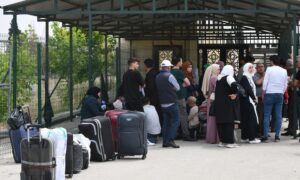New Hope for Justice in Syria or an ICC Double Standard?
Why “ICC may exercise jurisdiction over crimes in Myanmar” but not Syria?
Mansour Omari
A week ago, on 18 September 2018, the International Criminal Court (ICC) announced that it opened a Preliminary Examination concerning the alleged deportation of the Rohingya people from Myanmar to Bangladesh. This good announcement for the victims of this crime, hoping they receive justice, came after the ICC announced it may indeed exercise jurisdiction over the deportation, as well as potentially other crimes under article 7 of the Rome Statute on 6 September 2018. But why the ICC didn’t do the same for Syria?
During my correspondence with the ICC regarding its jurisdiction over Syria, I received from it:
“Several conditions have to be met for the ICC to have jurisdiction over a crime. The Prosecutor’s sentence is about one of them, the type of a crime, and can’t be read separately from the Court’s legal framework.
Please note that the ICC is concerned about any country where crimes are reported to be committed. However, the ICC can intervene only in accordance with the rules conditioning its jurisdiction. Syria is not a state party to the International Criminal Court. Unless Syria accepts the ICC jurisdiction, the only way that ICC would have jurisdiction over the situation would be through a referral by the Security Council like it was done for Libya and Darfur.”
Are these conditions, which have been applied in the case of Myanmar, the same as in the case of Syria?
On 9 April 2018, the Office of the Prosecutor of the ICC sought a ruling on a question of jurisdiction: whether the Court may exercise jurisdiction over the alleged deportation of more than 725,000 women, men and children from Myanmar to Bangladesh since 25 August 2017.
Myanmar is not a state party to the ICC, and the serious violations taking place within its borders do not fall under the Court’s territorial jurisdiction, unless it was accepted by Myanmar, or a referred by the United Nations Security Council.
But, Bangladesh, Myanmar’s neighbouring country is a State Party to the ICC, and the Court found that it had jurisdiction over the crime against humanity of deportation as an element of that crime was completed on the territory of Bangladesh.
The Court also found that as the Rohingya had been unlawfully compelled to remain outside their own country and to live in appalling conditions in Bangladesh, the ICC may have jurisdiction over the crime against humanity of persecution and / or ‘other inhumane acts’ which it said constituted a severe deprivation of the Rohingya’s fundamental human rights, according to Amnesty international.
The ICC explained the reasons for its acceptance of jurisdiction and began investigating Myanmar crimes:
“Consistent and credible public reports reviewed by the Prosecution indicate that since August 2017 more than 670,000 Rohingya, lawfully present in Myanmar, have been intentionally deported across the international border into Bangladesh. The UN High Commissioner for Human Rights has described the Rohingya crisis as “a textbook example of ethnic cleansing”, and according to the UN Special Envoy for human rights in Myanmar, it potentially bears the “hallmarks of a genocide”. The coercive acts relevant to the deportations occurred on the territory of a State which is not a party to the Rome Statute (Myanmar). However, the Prosecution considers that the Court may nonetheless exercise jurisdiction under article 12(2)(a) of the Statute because an essential legal element of the crime—crossing an international border—occurred on the territory of a State which is a party to the Rome Statute (Bangladesh).”
So, one defining element for the ICC jurisdiction is the type of crime which is alleged ethnic cleansing in the case of Myanmar, and this type does not apply to the crime of displacement according to the UN definition of “ethnic cleansing” or “genocide“.
However, the ICC says in its website:
“The Court may exercise jurisdiction in a situation where genocide, crimes against humanity or war crimes were committed on or after 1 July 2002”.
This means its jurisdiction also includes “crimes against humanity” and “war crimes”, the crimes that are committed in Syria, according the UN itself in most of its reports.
In other words, the two elements, that allowed the Court to accept jurisdiction over Myanmar crimes are available in the Syrian case, provided that Jordan cooperates with the ICC, which Syria’s only neighbouring country State party to the Rome Statute.
Inspecting the “essential legal element of the crime—crossing an international border —occurred on the territory of a State which is a party to the Rome Statute (Bangladesh)”, it can apply in cases of “forced displacement”, which fall under the category of “crimes against humanity” and “war crimes” that are within the jurisdiction if the ICC, and in the Syrian case it is “forced displacement” of Syrians to Jordan.
Perhaps this element would prevent Syria’s non-neighbouring countries from cooperating with the ICC in this regard. But can the continuity of the crime of forced displacement and the suffering, instability, risking lives to cross the seas, be considered an essential element of this crime that is not ended until the arrival of those displaced to safety in Greece or Germany, for example? This may be subject to legal and moral controversy.
But it raises the question of the possibility of the cooperation of one of the European countries that have received large numbers of victims of such crimes, such as Germany, Sweden, Greece and other state parties to the ICC.
So, does this ICC ruling apply to Syria?
Of course, yes.
First, Syria is not a state party to the ICC, such as Myanmar.
Second, were large numbers of Syrians forcibly displaced to neighbouring country?
Yes, and they are well documented by the UN.
Third, is this neighbouring country (Jordan) a state party to the ICC?
Yes, and it is the only neighbouring country and a state party to the ICC.
Can Turkey as neighbouring country join the Rome Statute?
Yes, but the priority in this decision is to its internal calculations. Still this could form a big pressure card for Turkey on the Syrian regime.
Can Syria’s non- neighbouring countries intervene?
Theoretically yes, because of the huge numbers of Syrian victims who have been displaced and have reached Germany and Sweden, for example.
References
Websites of:
The International Criminal Court
Amnesty International
The Independent International Commission of Inquiry on the Syrian Arab Republic
if you think the article contain wrong information or you have additional details Send Correction
-
Follow us :

















 A
A
A
A
A
A







 More Opinion
More Opinion